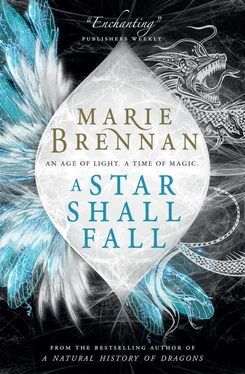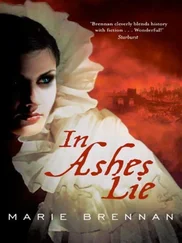“Then come back,” she said.
No one understood her. Irrith fumbled for an explanation. “There’s a manor house in Berkshire that’s haunted by the ghost of some lady. Not all the time; just on the night of her wedding. I have no idea where she goes the rest of the time, but couldn’t Galen do that? Come back once a year—at least until this place is safe?” Until the desire binding him to this world faded enough for him to let go.
Lune didn’t answer immediately. She turned instead to Delphia. Any normal woman might have argued, out of confusion or piety or simple instinct, but Galen had married one who understood; she nodded. Then Lune said, “I cannot promise it will be so; that, I fear, lies beyond me. But I can leave the door open. If you wish to return, nothing here will prevent you.”
It wasn’t certainty. It was enough for Galen, though. A smile broke across his face, like dawn breaking clear after the endless months of clouds. The image spread across Irrith’s memory like a balm, blotting out the horror of Cannon Street and the black holes of his eyes, and the relief brought her almost to tears. “Good-bye—for now,” she whispered, and heard Delphia and Lune echo her with their own farewells.
And the light grew. It came from everywhere and nowhere, shining through the fading substance of Galen’s ghostly body. It should have burnt, like church bells and prayers; Irrith felt in it that same holy force, the touch of the divine. It could have burnt, if it chose. But the light passed through her without harm, shining in the depths of London’s faerie realm, and then it was gone, as if it had never been.
Irrith drew in a deep breath, let it out slowly, and said to the Queen, “Yes. I’ll stay.”
ROYAL OBSERVATORY, GREENWICH
6 October 1835
Frederick Parsons stepped away from the eyepiece and grinned. “And there it is. Just like it was seventy-six years ago.”
His companion raised both eyebrows dryly. “Not just like, I should think. May I see?”
Frederick waved him forward. His companion had to bend farther to reach the eyepiece, but despite the discomfort, stayed in that position for a long time, studying the heavens above.
Far in the distance—unimaginably far, though not incalculably so—a “star” blazed across the sky. They weren’t the only curiosity-seekers at Greenwich, come to observe the return of Halley’s famed comet, but they were the only ones to bring their own telescope. The Royal Observatory yet remained far enough outside of London’s gaslights and filthy smoke to be a good point from which to see such wonders.
Other comets came and went, of course, but they didn’t interest Frederick as this one did. He’d been born only twenty-four years before: far too recently to have seen its last apparition, and far too long ago to have any hope of seeing the next one. This was his only chance to observe the comet that had nearly destroyed London.
His companion had watched it from France, though. Yvoir had spied on the great Charles Messier himself, and sneaked an opportunity to use the astronomer’s own equipment one night when Messier lay coughing in bed. He claimed to have sensed the malevolent presence of the Dragon, but Frederick thought the faerie was making it up.
“We should figure out some way to drag Master Ktistes up here,” Frederick said, bored with watching Yvoir watch the sky. “You could put a glamour on him, to hide the horse body.”
“Hiding it doesn’t make it go away,” Yvoir said, still hunched over. “I don’t fancy putting him on a steamboat for a jaunt down the river. Besides, it hardly matters now. This is a historical curiosity, nothing more. The academy has other concerns.”
Frederick sniffed, doing his best impression of a stuffy old man. “There’s no respect for history nowadays—not even for our poor martyred founder.” He dug a stone out of the dirt with the toe of his shoe. “They say he haunts the Hall, you know. But I don’t believe it.”
“Lady Delphia believed,” the French faerie told him. “And since she was the patroness of the Galenic Academy, I would say you’re the one with no respect for history, my friend.” He straightened at last, with faerie suppleness that even Frederick’s young joints could envy.
At least until impatience banished it. Frederick said, “Very well; we’ve seen the comet. Now can we go back? Wrain claims he finally has a working model of his aetheric engine, and I don’t want to miss the chance to laugh at him when it fails again.”
Together the faerie and the mortal packed up their telescope and then raced down the steep slope of the observatory’s hill, running by the light of the full moon and the stars, and the wandering star of the comet, trailing its bright banner across the sky.
Like the other Onyx Court books, A Star Shall Fall owes a great deal to the people who assisted me in my research. In London, that included Mick Pedroli of Dennis Severs House, for advice on living in an eighteenth-century style; Eleanor John of the Geffrye Museum, for answers about house furnishings; Rupert Baker and Felicity Henderson of the Royal Society Library, for fetching out comet books and many dusty volumes of Royal Society minutes; Dr. Rebekah Higgitt and Dr. Jonathan Betts of the Royal Observatory, Greenwich, for assistance with the history of the observatory and horology respectively; Susan Kirby, Alan Lilly, and Mimi Kalema of Tower Bridge Authority, for letting me into the basement of the Monument very early on a Saturday morning; and Dr. Kari Sperring and her husband, Phil Nanson, for touring me around Cambridge and even taking me punting.
I also needed a great deal of help via e-mail, on a variety of arcane topics. John Pritchard sent me a fabulous diagram of the Monument; Ian Walden advised me about local flora; Farah Mendlesohn was my go-to woman for Jewish history; Ricardo Barros of the Mercurius Company helped me figure out eighteenth-century dancing; Rev. Devin McLachlan did the same for eighteenth-century Anglican theology; and Dr. Erin Smith made the astronomy go. For information on Ottoman Arabic society, the Arabic language, and the nature of genies, I owe thanks to Yonatan Zunger, Saladin Ahmed, and Rabeya Merenkov. Sherwood Smith did the German translations for me, and Aliette de Bodard not only knew what iatrochemistry was, but could tell me how to say it in French.
The late-night conversations this time were with Adrienne Lipoma and my husband, Kyle Niedzwiecki, with an assist from Jennie Kaye. They very kindly let me talk at them endlessly about the book, and provided more than one useful suggestion.
And then there are all the authors who wrote books I made use of. They are too many to list here, but as always, the bibliography is available on my website:
http://www.swantower.com/.
American fantasy writer Marie Brennan habitually pillages her background in anthropology, archaeology and folklore for fictional purposes. In addition to the Onyx Court series, she is author of the Doppelganger duology of Warrior and Witch , the urban fantasy Lies and Prophecy , and the highly acclaimed Natural History of Dragons fantasy series, as well as more than forty short stories.
ALSO AVAILABLE FROM TITAN BOOKS
MIDNIGHT NEVER COME
MARIE BRENNAN
In hidden catacombs beneath London, below the royal court of Elizabeth I, a second queen holds power: Invidiana, the dark ruler of faerie England. Fae and mortal politics have become inextricably entwined, in alliances and betrayals. When the faerie Lune is sent to manipulate Elizabeth’s spymaster, her path crosses that of a mortal agent, Michael Deven, who is seeking the hidden hand in English politics. Will they be able to find the source of Invidiana’s power? Find it, and break it…
Читать дальше












